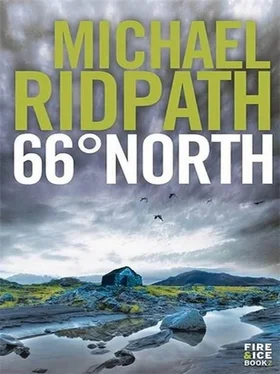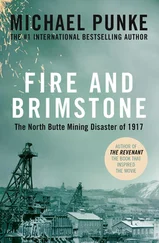Harpa walked rapidly along the edge of the bay, head down. The sun was out and the clouds had lifted off Mount Esja, but she scarcely noticed. She had been shaken by the return of the detective Magnús with the policewoman from Scotland Yard. Now the police knew about Óskar and about Markús, they wouldn’t leave her alone.
She had been distracted all morning, and eventually Dísa had given her an hour off. Harpa had explained that the police were asking about Gabríel Örn’s suicide, and that she was the banker’s former girlfriend. Dísa listened with sympathy, but Harpa could detect a hint of suspicion. Dísa was clearly wondering why in that case the police had asked her where Harpa was on Tuesday and Wednesday.
It was bad enough having to lie to Dísa, or at least to conceal the truth. But it was Markús that Harpa was having real problems with. She couldn’t look him in the eye. She couldn’t look her own son in the eye!
He had begun to realize something was wrong. Usually so well behaved, he had started to act up. That would only get worse.
And now that the police knew that Óskar was his father, it would be impossible for Harpa to keep that quiet. Markús would find out in the end, as would Óskar’s family. Maybe even the press. And then, eventually, he would discover that his mother was a murderer.
Harpa had a strong bond with her son. The fear that that might be shattered terrified her.
She was desperate to call Björn. But he was out in the middle of the Atlantic somewhere.
She couldn’t go on like this. She should put an end to it all. Go to the police station and confess everything. Face up to what she had done. She hadn’t meant to kill Gabríel, the judge would understand that. Perhaps she would be found guilty of manslaughter instead of murder. She would go to jail, but not for the rest of her life. This was Iceland after all, with its famously lenient legal system.
But they would arrest Björn as well. He would probably be locked up as an accessory or conspirator or whatever they called it, as would the others who had helped her, even that student, Ísak, who had been suspicious of her at first. They had done so much for her, she couldn’t betray them now.
And what about Markús? Sure, her mother would look after him, look after him very well, but Harpa couldn’t bear the thought of missing him grow up.
She took a deep breath. Somehow she would have to get through this, stick to her story, keep her wits about her, keep herself out of jail. Somehow she would have to find the strength to do that.
She sniffed. The moisture on her cheeks cooled in the crisp air. She hadn’t even realized she was weeping. She was falling apart.
It was strange. She used to think of herself as a tough woman, smart and tough. You had to be to get on in Ódinsbanki. Although there were women in all jobs in Iceland, the banks had a macho culture. Work hard, play hard. They won deals because they were quicker than everyone else and they were ready to take risks that other banks wouldn’t. Óskar had insisted that they all read his favourite book, Blink by Malcolm Gladwell, with its thesis that the best decisions were those taken by instinct in seconds. Harpa had kept up, helped, she had to admit, by Gabríel Örn. They were a team: Harpa was his analytical muscle, he had the aggression and ruthlessness to close the deals.
And they had been fun, those glory days, she couldn’t pretend they hadn’t been. The trips to the Monaco Grand Prix, the yachts in the Mediterranean, the birthday parties in Barbados, following Manchester United Football club to exotic cities around Europe. It was only after going out with Gabríel for three months that Harpa realized he had supported Liverpool all his life, at least until he joined Ódinsbanki and discovered that Óskar followed Manchester United.
But she wasn’t much better. She hated football. She just didn’t let anyone at work know that.
Then there were the salmon fishing trips back in Iceland. That was corporate entertaining on a spectacular scale. Fly the clients to Reykjavík by private jet, and then from the City Airport to the river by helicopter. Each client had his own gillie, and even the most cack-handed could land a salmon. Her father had been so jealous. And proud.
She smiled.
But it was never going to last. In her heart of hearts she had known that. She had argued furiously with Gabríel over the car dealership deal, and the chain of shoe shops, both in Britain, both now bankrupt. And there were several others that she had serious doubts over. They would do fine while the economy was growing, but come a recession and they wouldn’t be able to meet their interest payments. That was a feature of nearly every deal Ódinsbanki did.
They were winging it. And when the recession did come, everything crashed at once.
She knew that would happen. While the others had such boundless optimism, such faith in their own abilities that they thought they had defied the laws of boom and bust, she never really believed it. Yet she had still followed them blindly.
Something else to feel guilty about.
She approached the harbour. She saw Kaffivagninn and smiled. She had had a part-time job there as a waitress for a few years when she was at school. She used to love to hang around the harbour. Her favourite job was cleaning out the Helgi , her father’s boat. Sometimes she would find coins and she would be allowed to keep them. It was ironic, at school people saw her as a ‘quota princess’, but in reality her father made her earn all her money.
Of course, that was the real reason she had liked to hang around the harbour, to be near him. She didn’t see him for days at a time. He would often arrive home after she had gone to bed, and be off again before she had woken up. But he loved her. His love for her was always unquestioning. It was to please him that she had worked so hard at school, that she had got a job in a bank, that she had earned so much money.
She was amazed that he had forgiven her for losing him all his savings. He had a hot temper and bore grudges, and his money was extremely important to him. She had been terrified that he would never forgive her.
But he had. Over time she realized that he had decided that she had been duped as well, that in his eyes she was just as much a victim as him. While this wasn’t true, Harpa was extremely grateful.
She looked at her watch. Only ten minutes until she was due back at the bakery. She didn’t want to abuse Dísa’s kindness, so she hurried to the bus stop and caught a number 13 back to Seltjarnarnes.
MAGNUS’S SPIRITS ROSE as he drove north from Reykjavík. The clouds were blown away and the sun shone out of a pale blue sky. It felt good to fly along the open road, away from the people and the bustle of the city, the grey sea shimmering to his left, the mountains looming on his right.
The road plunged deep under Hvalfjördur, Whale Fjord, one of the deepest fjords in Iceland, swung through a valley between two fells and then crossed Borgarfjördur, its surface creased by strong currents. Just beyond the little town of Borgarnes, the road forked to the left. A couple of kilometres outside the town was the church of Borg, where Egill had lived, the hero of one of Magnus’s favourite sagas.
The sagas were like the great architectural monuments of other countries. In a land with no great settlements and precious few sizeable buildings, Icelanders looked to their literature for a sense of their identity, of their past. During his adolescence in America, and then later into adulthood, Magnus had read and reread these medieval tales obsessively, conjuring in his mind’s eye the heaths and fjords of Iceland in the tenth century.
Читать дальше












